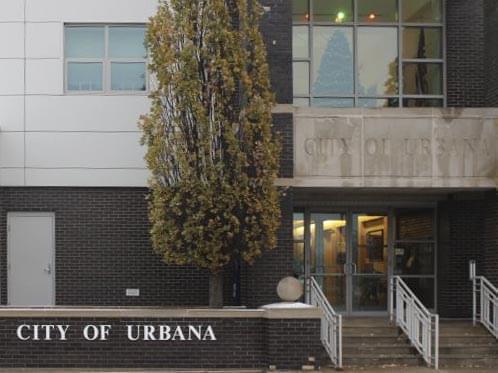Urbana City Officials Are Trying To Remedy A Structural Deficit In Their Budget. What Is That?

The Urbana City Building Jeff Bossert/Illinois Public Media
For the second year in a row, Urbana's budget plan includes spending cuts meant to address a structural deficit. They'll be part of the discussion on Monday June 10 at 7 PM at the City Building, when the Urbana City Council holds a public hearing on the budget proposal, followed by a discussion and vote in its Committee of the Whole meeting (a final city council vote is scheduled for June 17). But what's a structural deficit?
That's deficit that’s built into a budget, unless changes are made. In an interview recorded May 20, when the budget plan was first released, Urbana Finance Director Elizabeth Hannon talked about what a structural deficit is, and what can be done about it.
Hannon: You have a structural deficit whenever your expenditures are growing faster than your revenues, which is the situation we're in currently. And we're trying to work our way out of.
Meadows: What caused this structural deficit?
Hannon: Oh, gosh, certainly a big contributor, or actions that the state took in the last few years to reduce revenues that are shared with cities. But we also experienced following the Great Recession, years of slow growth in property values, which affected our property tax revenues, and years of slow growth in sales tax revenues.
Meadows: So the city's in a position where the amount of revenue they've come to expect from the state and from tax sources is down. If it's growing, it's not growing like it used to, or it's not growing at all. But expenditures, even if you do nothing, are growing at a certain extent?
Hannon: Right. So when we talk about the structure of budget deficit, we're really talking about the city's General Fund, which is where we're we pay for Police, Fire and most Public Works services. In that fund, about three quarters of our expenses are personnel expenses. And so those costs are going to go up every year, as people's wages increase, as our cost of providing health insurance increases, as the cost of pensions increase. We can't just, you know, hold the line, it just isn't something that can happen.
Meadows: The city was addressing this in the current budget. I understand. So there were some reductions that were made, going into FY 2019?
Hannon: Yes, correct. We reduced the FY 2019 budget by about half a million dollars.
Meadows: And was that simply by, like, trimming the number of personnel, of full time employees, or were there other things done?
Hannon: Yeah, a large part of it was just reducing the number of positions. But one of those significant changes that involved a reduction in staffing was closing the Civic Center. So that's probably the thing in FY '19, that was perhaps most notable to some folks,
Meadows: That was something that eliminated staff positions connected to the Civic Center.
Hannon: Yes. Right.
Meadows: So for this new budget going in, there are more reductions like that? And what would you say was the biggest area?
Hannon: the largest part of reductions took place in the Executive Department, and in the Public Works Department, where we did a significant reorganization of staff.
Meadows: Is there anything else besides just reducing the number of positions on city staff that the city does to address the expenditure problems in a structural deficit?
Hannon: Sure. So we're always looking for options that don't involve reducing staff. Unfortunately, we've used most of those options. But one of the significant reductions in the FY '20 budget is that we're looking at different ways to address our projected deficit in the Equipment Replacement Fund, which is primarily funded with transfers from the General Fund. So one of the things we'll be talking about in the budget review is our new plan for
financing Capital Equipment Replacement. And that had a positive impact on the General Fund of about $120,000 a year.
Meadows:This is something that you expect to still be an issue when you come around to the 2021 budget?
Hannon: In terms of addressing the structural budget deficit? Absolutely. Yes. We're still working on it. We're making progress.

